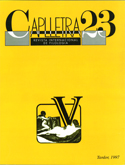El «Tirant lo Blanch» i les seues traduccions anteriors al segle XIX: aspectes de recepció i de traducció
DOI:
https://doi.org/10.7203/caplletra.23.7295Keywords:
Tirant lo Blanch, traduccions anteriors al s. XIX Abstract
Abstract
On the basis of the premise that every translation is a recreation to a great extent, the author studies the translations of Tirant lo Blanch into Castilian, Italian and French made before the XIXth century. By means of the comparison of texts and the analysis of quotations, notations and, in general, all the difficulties found in the different manuscripts where these translations are kept, Vicent Martines elaborates a history of the reception by these three cultures of the Valencian novel. Through this history we can find out that Tirant lo Blanch was not very different from a chivalresque book of this period (as regards the typographic solutions, the format and the publishers' and translators' remarks) and that it was interpreted as a real chivalresque manual.
 Downloads
Downloads
Downloads
Published
How to Cite
-
Abstract303
-
PDF (Català)148
Issue
Section
License
Authors submitting work to Caplletra for publication must be the legitimate holder of the usage rights. Legitimacy for the purposes of publishing the work must also include images, tables, diagrams and any other materials that may complement the text, whether they are the author of such material or not.
Copyright: on publishing their work in the journal, the author grants Caplletra. Revista Internacional de Filologia usage rights (reproduction, distribution and public communication) for both the paper printed version and for the electronic version.
All work published in Caplletra is covered by the Creative Commons license type Attribution-NonCommercial-NoDerivatives 4.0 (CC BY-NC-ND 4.0).
RESPONSABILITY
Caplletra. Revista Internacional de Filologia does not necessarily identify with the points of view expressed in the papers it publishes.
Caplletra. Revista Internacional de Filologia accepts no responsibility whatsoever for any eventual infringement of intellectual property rights on the part of authors.






